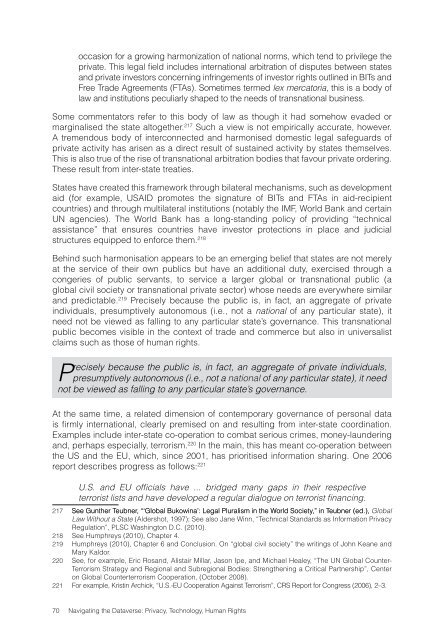Navigating the Dataverse: Privacy, Technology ... - The ICHRP
Navigating the Dataverse: Privacy, Technology ... - The ICHRP
Navigating the Dataverse: Privacy, Technology ... - The ICHRP
You also want an ePaper? Increase the reach of your titles
YUMPU automatically turns print PDFs into web optimized ePapers that Google loves.
occasion for a growing harmonization of national norms, which tend to privilege <strong>the</strong><br />
private. This legal field includes international arbitration of disputes between states<br />
and private investors concerning infringements of investor rights outlined in BITs and<br />
Free Trade Agreements (FTAs). Sometimes termed lex mercatoria, this is a body of<br />
law and institutions peculiarly shaped to <strong>the</strong> needs of transnational business.<br />
Some commentators refer to this body of law as though it had somehow evaded or<br />
marginalised <strong>the</strong> state altoge<strong>the</strong>r. 217 Such a view is not empirically accurate, however.<br />
A tremendous body of interconnected and harmonised domestic legal safeguards of<br />
private activity has arisen as a direct result of sustained activity by states <strong>the</strong>mselves.<br />
This is also true of <strong>the</strong> rise of transnational arbitration bodies that favour private ordering.<br />
<strong>The</strong>se result from inter-state treaties.<br />
States have created this framework through bilateral mechanisms, such as development<br />
aid (for example, USAID promotes <strong>the</strong> signature of BITs and FTAs in aid-recipient<br />
countries) and through multilateral institutions (notably <strong>the</strong> IMF, World Bank and certain<br />
UN agencies). <strong>The</strong> World Bank has a long-standing policy of providing “technical<br />
assistance” that ensures countries have investor protections in place and judicial<br />
structures equipped to enforce <strong>the</strong>m. 218<br />
Behind such harmonisation appears to be an emerging belief that states are not merely<br />
at <strong>the</strong> service of <strong>the</strong>ir own publics but have an additional duty, exercised through a<br />
congeries of public servants, to service a larger global or transnational public (a<br />
global civil society or transnational private sector) whose needs are everywhere similar<br />
and predictable. 219 Precisely because <strong>the</strong> public is, in fact, an aggregate of private<br />
individuals, presumptively autonomous (i.e., not a national of any particular state), it<br />
need not be viewed as falling to any particular state’s governance. This transnational<br />
public becomes visible in <strong>the</strong> context of trade and commerce but also in universalist<br />
claims such as those of human rights.<br />
Precisely because <strong>the</strong> public is, in fact, an aggregate of private individuals,<br />
presumptively autonomous (i.e., not a national of any particular state), it need<br />
not be viewed as falling to any particular state’s governance.<br />
At <strong>the</strong> same time, a related dimension of contemporary governance of personal data<br />
is firmly international, clearly premised on and resulting from inter-state coordination.<br />
Examples include inter-state co-operation to combat serious crimes, money-laundering<br />
and, perhaps especially, terrorism. 220 In <strong>the</strong> main, this has meant co-operation between<br />
<strong>the</strong> US and <strong>the</strong> EU, which, since 2001, has prioritised information sharing. One 2006<br />
report describes progress as follows: 221<br />
U.S. and EU officials have ... bridged many gaps in <strong>the</strong>ir respective<br />
terrorist lists and have developed a regular dialogue on terrorist financing.<br />
217 See Gun<strong>the</strong>r Teubner, “‘Global Bukowina’: Legal Pluralism in <strong>the</strong> World Society,” in Teubner (ed.),<br />
See Gun<strong>the</strong>r Teubner, “‘Global Bukowina’: Legal Pluralism in <strong>the</strong> World Society,” in Teubner (ed.), Global<br />
Law Without a State (Aldershot, 1997); See also Jane Winn, “Technical Standards as Information <strong>Privacy</strong><br />
Regulation”, PLSC Washington D.C. (2010).<br />
218 See Humphreys (2010), Chapter 4.<br />
219 Humphreys (2010), Chapter 6 and Conclusion. On “global civil society” <strong>the</strong> writings of John Keane and<br />
Mary Kaldor.<br />
220 See, for example, Eric Rosand, Alistair Millar, Jason Ipe, and Michael Healey, “<strong>The</strong> UN Global Counter-<br />
Terrorism Strategy and Regional and Subregional Bodies: Streng<strong>the</strong>ning a Critical Partnership”, Center<br />
on Global Counterterrorism Cooperation, (October 2008).<br />
221 For example, Kristin Archick, “U.S.-EU Cooperation Against Terrorism”, CRS Report for Congress (2006), 2–3.<br />
70 <strong>Navigating</strong> <strong>the</strong> <strong>Dataverse</strong>: <strong>Privacy</strong>, <strong>Technology</strong>, Human Rights
















